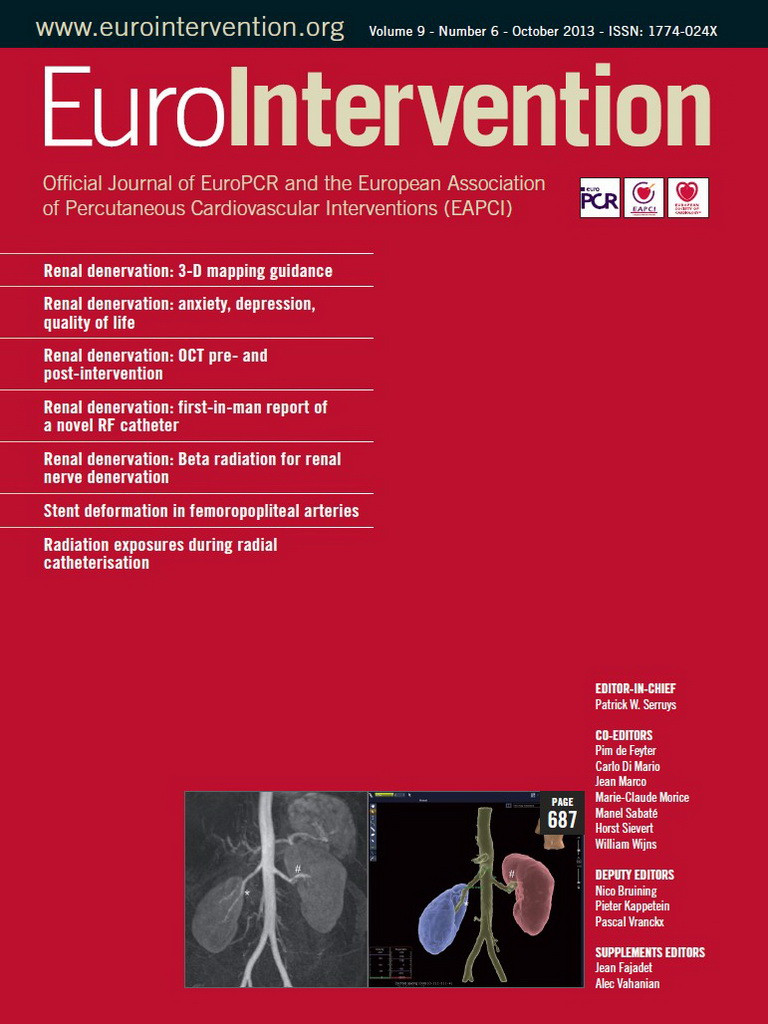Based on the robust preclinical and clinical data surrounding the important role of renal sympathetic nerves in various aspects of blood pressure control1, a novel catheter-based approach using radiofrequency energy to target and disrupt the renal nerves selectively has been developed2. Available evidence from trials in patients with resistant hypertension in whom renal denervation has been performed indicate that the procedure has a favourable safety profile2 and is associated with a substantial and sustained blood pressure reduction3.
In this issue of the journal, Lenski and colleagues noted that antihypertensive treatment with renal denervation was accompanied by a significant improvement in symptoms of anxiety and depression, quality of life, cognitive performance in response to a multitasking stress test, and intensity of headache4. On admission to the study, patients displayed an apparent impairment in executive function compared to normative data. Following renal denervation, patients performed better in the Wiener multitasking test: reaction times, accuracy and the number of processed stimuli were all improved. These observations are consistent with previous data that demonstrated a significant improvement in symptoms of depression and in mental health-related quality of life5 three months following denervation in patients with resistant hypertension. In both studies the improvements were not related to the magnitude of blood pressure reduction achieved with renal denervation, suggesting that modulation of sympathetic nerve activity via renal denervation may perhaps contribute to this favourable effect on cognition and mental health. While the lack of randomisation, the observational nature of the study, the absence of structured diagnostic interviews for the determination of anxiety and depression and the use of the multitask test rather than a global cognitive test, such as the Wechsler Adult Intelligence Scale or Addenbrooke’s cognitive examination, are caveats that should be addressed in future investigations, the results are of interest and add to the apparent pleiotropic effects of renal denervation.
There exists convincing evidence indicating that hypertension, particularly in midlife, increases the risk of cognitive decline and the development of dementia later in life6-8. Cognitive deficits in hypertension are often subtle but may occur across multiple neuropsychological domains, including learning and memory, attention, abstract reasoning, mental flexibility, psychomotor skills, and visuospatial abilities9. Whether chronic sympathetic activation could predispose to dementia development, perhaps through influences on cerebral perfusion, is unknown.
In line with the idea that the initiating factor in dementia development may involve a reduction in cerebral blood flow leading to brain hypoperfusion, neurodegeneration and cognitive impairment, previous work documented a reduction in cerebral cortical perfusion in unmedicated patients with essential hypertension10. While a potential association between the reduction in cortical perfusion and impaired cognitive performance was not examined in this study, the link between hypertension and cognitive decline in general is very strong. Low cerebral blood flow has been shown to be linked with an increased risk of developing white matter lesions11 and to be associated with the development of dementia12. While much attention in dementia research has justifiably focussed on the central cholinergic system, other neuronal systems, including the noradrenergic system, are also implicated. The majority of noradrenaline in the brain is located in the locus coeruleus, which, together with its hypothalamic and amygdala projections, is functionally linked with behavioural responses involving autonomic activation and cognition13-15. Post-mortem examination of the locus coeruleus in Alzheimer’s disease has demonstrated low noradrenaline and high levels of its deaminated and O-methylated metabolite, 3-methoxy-4-hydroxyphenylglycol16. This neurochemical pattern may be indicative of increased neuronal activity in the face of a reduction in neuronal number. Preclinical studies indicate that denervating renal afferent nerves reduces the firing of neurones in the hypothalamus and locus coeruleus17. Patients with hypertension also exhibit increased brain noradrenaline turnover10, and increased brain noradrenaline turnover has been linked to the degree of sympathetic nervous activation and blood pressure10,18.
Whether there is a biological basis for the improvements in mental health-related quality of life and cognitive performance following renal denervation remains to be determined. Although the link between sympathetic nervous activation, renal function and hypertension is well established, it is perhaps less well appreciated that normotensive subjects with even moderate chronic kidney disease perform worse in tests of visual attention, learning and concentration19. With further decline in renal function there occurs a parallel worsening of cognitive performance20. While it may be convenient to ascribe this association on the basis of conventional cardiovascular risk factors, afferent nerves in the kidney do project to the brain and have been shown to influence the firing rate of medullary and hypothalamic units in the cat21. In rats with chronic renal failure, renal afferent nerve denervation prevents both the development of hypertension and an increase in norepinephrine turnover rate in certain hypothalamic nuclei and the locus coeruleus17. Taken together, it is plausible that the afferent signals, from the diseased kidney to the brain, may impact directly on cognition through influencing neuronal activity in the hypothalamus or locus coeruleus.
Given the ageing population and the burden of dementia on patients, their families and the healthcare budget, the identification and implementation of novel therapeutic strategies in order to avert or delay cognitive decline is of major clinical importance. Whether renal denervation indeed improves aspects of cognitive function independent of the blood pressure changes needs to be addressed in future studies.
Funding
This work was supported by grants from the National Health and Research Council of Australia (NHMRC) and the Victorian Government’s Operational Infrastructure Support Program. Professors Schlaich and Lambert are supported by career awards from the NHMRC.
Conflict of interest statement
The laboratories of M.P. Schlaich and G.W. Lambert currently receive research funding from Medtronic, Abbott Pharmaceuticals and Servier Australia. M.P. Schlaich serves on scientific advisory boards for Abbott (formerly Solvay) Pharmaceuticals, Novartis Pharmaceuticals and Medtronic and has received honoraria and travel support from Abbott, Servier, Novartis, and Medtronic. G.W. Lambert has acted as a consultant for Medtronic and has received honoraria or travel support for presentations from Pfizer, Wyeth Pharmaceuticals, Servier and Medtronic. A.K. Dhar has received travel support from Servier to attend investigator meetings.

